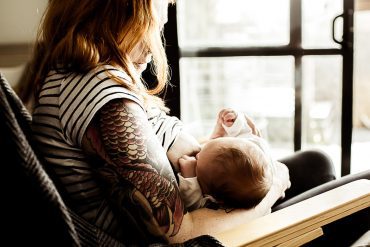More time spent in childcare is more stressful for parents
Our findings show the more time children spend in non-parental care, the greater level of parenting stress experienced by mothers and fathers. This finding is true of both mothers and fathers, which is surprising, given that mothers are often responsible for managing childcare.
We argue that while a father can assume the role of primary carer, relieving mothers of full parenting responsibility, replacement care does not relieve parents of role responsibility in the same way.
We found that mothers and fathers who used informal and family care had lower parenting stress scores, indicating less stress, than parents who used other childcare packages. Most of the informal and family care provided in our sample was undertaken by grandparents.
Previous research has found informal and family care arrangements, especially grandparent care, has advantages over other child care packages. It is more flexible and considerably cheaper than formal childcare.
The use of informal and family care may lower levels of parenting stress because using one’s own family members, such as a grandparent, is similar to co-parenting, as it involves sharing practical and emotional aspects of parenting.
The use of informal and family care may lower levels of parenting stress because using one’s own family members, such as a grandparent, is similar to co-parenting, as it involves sharing practical and emotional aspects of parenting.
Implications
Childcare is critical to mothers’ workforce participation, especially impoverished women in developing economies. Yet governments struggle to provide adequate childcare support for parents.
Formal care is the most common childcare package used in Australia, yet there are numerous issues including quality, cost, and fit. And as our research shows, it does not relieve parents of the stress that informal and family care does.
However, formal childcare is beneficial to children. Research has shown that quality early childhood education is linked to better student learning outcomes at later ages. It is also linked to a better start at school: children who attended early childcare education programs have better language, reading, numeracy and social skills.
Our results may also explain why many grandmothers provide childcare for their families.
While for some grandparents, caring for their grandchildren is rewarding, is not without its challenges, and grandparents often need a balance between their own lives and care commitments. Importantly, grandparents are now eligible for a childcare benefit.
Grandparent care is not always available, especially as governments try to increase older female workforce participation. If both younger and older women need to increase their workforce participation, there will be increased pressure to use care outside the family.
Thus, governments need to acknowledge the stresses involved and ensure that families can access affordable, conveniently-located care. They must also ensure policies regarding labour force participation are complemented by a supportive and flexible high-quality child care.
Brendan Churchill, Research Fellow in Sociology, University of Melbourne and Lyn Craig, Professor of Sociology and Social Policy, University of Melbourne
This article is republished from The Conversation under a Creative Commons license. Read the original article.










